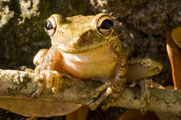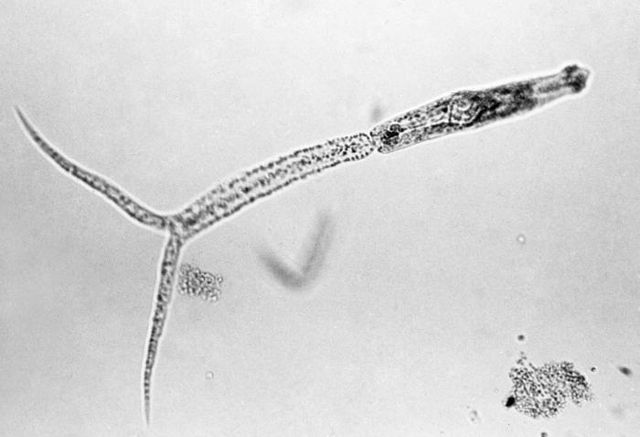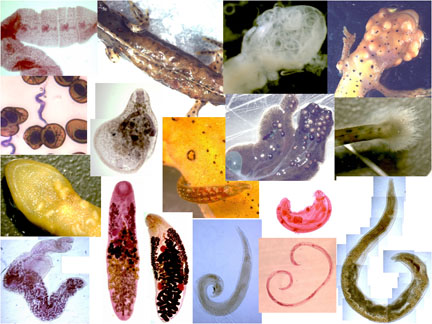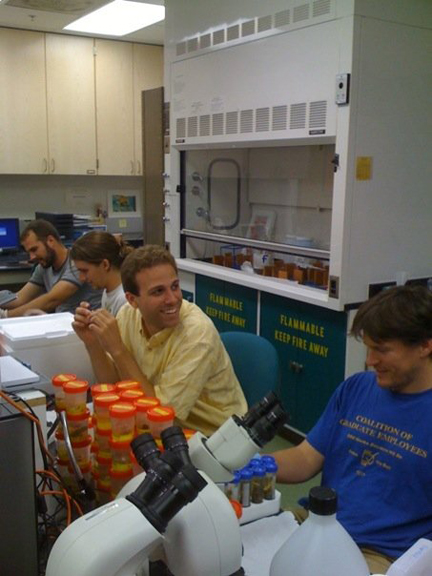

Rohr Laboratory of Ecology and Public Health
| Disease and Parasite Ecology |
||
Parasites
Not parasites
|
Disease and Parasite Ecology |
|
Human and wildlife diseases are emerging at an unprecedented rate (Daszak et al. 2000, Wolfe et al. 2007). Since this is primarily due to changes in the ecology of hosts and parasites (Schrag and Wiener 1995), understanding the environmental factors driving these changes will be essential to designing effective control strategies. Environmental change can have complex effects on parasite transmission that depend on the specific interactions among hosts, parasites, and biotic and abiotic conditions. Consequently, we have been studying the ecology of hosts and parasites, and the dependence of these interactions on biotic and abiotic conditions. We have become particularly interested in the effects of pollution, climate, landscape patterns, and community composition on disease risk in amphibians. Sample Publications Civitello, D.J., Cohen, J., Fatima, H., Halstead, N.T., Liriano, J., McMahon, T.A., Ortega, C.N., Sauer, E., Sehgal, T., Young, S., Rohr, J.R. 2015. Biodiversity inhibits parasites: broad evidence for the dilution effect. Proceedings of the National Academy of the United States of America 112: 8667–8671 (showcased by commentaries in PNAS and Science, double star recommendation by Faculty 1000, Altmetric score of 177, 99th percentile) Sears, B.F., Snyder, P.W., Rohr, J.R. 2015. Host life-history and host-parasite syntopy predict behavioral resistance and tolerance to trematode parasites. Journal of Animal Ecology 84:625-636 (Runner-up for best student paper award 2015 from the Disease Ecology Section of the Ecological Society of America) McMahon, T.A., Sears, B.F., Venesky, M.D., Brown, J.M., Deutsch, K., Halstead, N.T., Lentz, G., Tenouri, N., Young, S., Civitello, D.J., Ortega, N., Fites, J.S., Reinert, L.K., Rollins-Smith, L.A., Raffel, T.R., Rohr, J.R. 2014. Amphibians acquire resistance to live and dead fungus overcoming fungal immunosuppression. Nature 511:224-227 (cover photo and featured cover story; Altmetric score of 262, 99th percentile) Venesky, M.D., Liu, X., Sauer, E., Rohr, J.R. 2014. Linking manipulative experiments to field data to test the dilution effect. Journal of Animal Ecology 83:557-565 Rohr, J.R., Raffel, T.R., Halstead, N.T., McMahon, T.A., Johnson, S.A., Boughton, R.K., Martin, L.B. 2013. Early-life exposure to an herbicide has enduring effects on pathogen-induced mortality. Proceedings of the Royal Society of London B 280:20131502 (Altmetric score of 71) Sears, B.F., Snyder, P.W., Rohr, J.R. 2013. Infection deflection: hosts control parasite location with behavior to improve tolerance. Proceedings of the Royal Society of London B 280: 20130759 Liu, X., Rohr, J.R., Li, Y. 2013. Climate, vegetation, introduced hosts and trade shape a global wildlife pandemic. Proceedings of the Royal Society of London B 280: 20122506 double star recommendation by Faculty 1000 Raffel, T.R., Romansic, J.M., Halstead, N.T., McMahon, T.A., Venesky, M.D., Rohr, J.R. 2013. Disease and thermal acclimation in a more variable and unpredictable climate. Nature Climate Change 3: 146-151 (featured in News and Views, article by Ross Alford: http://www.nature.com/nclimate/journal/v3/n2/full/nclimate1812.html; Altmetric score of 36, 97th percentile) Koprivnikar, J., Marcogliese, D.J., Rohr, J.R., Orlofske, S.A., Raffel, T.R., Johnson, P.T.J. 2012. Macroparasite infections of amphibians: What can they tell us? EcoHealth 9: 342-360 Venesky, M.D., Mendelson, J.R., Sears, B.F., Stiling, P.D., Rohr, J.R. 2012. Selecting for tolerance against pathogens and herbivores to enhance the success of reintroduction and translocation programs. Conservation Biology 26: 586-592 Johnson, P.T.J., Rohr, J.R., Hoverman, J.T. Kellermanns, E., Bowerman, J., Lunde, K.B. 2012. Host life history explains interspecific variation in disease risk. Ecology Letters 15: 235-242 Sears, B.F.*, Rohr, J.R., Allen, J.E., Martin, L.B. 2011. The economy of inflammation: when is less more? Trends in Parasitology. 27: 382-387 Rohr, J.R., Dobson, A.P., Johnson, P.T.J., Kilpatrick, A.M., Paull, S.H., Raffel, T.R.†, Ruiz-Moreno, D., Thomas, M.B. 2011. Frontiers in climate change-disease research. Trends in Ecology and Evolution. 26: 270-277 Romansic, J.M.†, Johnson, P.T.J., Searle, C.L., Johnson, J.E., Tunstall, T., Han, B.A., Rohr, J.R., Blaustein, A.R. 2011. Individual and combined effects of multiple pathogens on Pacific treefrogs. Oecologia. 166: 1029-1041 Schotthoefer, A.M., Rohr, J.R., Cole, R.A., Koehler, A.V., Johnson, C.M., Johnson, L.B., Beasley, V.R. 2011. Effects of wetland and landscape variables on parasite communities of Rana pipiens: links to anthropogenic changes. Ecological Applications. 24: 1257-1271 Raffel, T.R.†, Lloyd-Smith, J.O.†, Sessions, S.K., Hudson, P.J., Rohr, J.R. 2011. Does the early frog catch the worm? Disentangling potential drivers of a parasite age-intensity relationship in tadpoles. Oecologia. 165: 1031-1042 Raffel, T.R.†, Michel, P.J. §, Sites, E.W. §, Rohr, J.R. 2010. Does temperature drive chytrid infections in newt populations? Associations with leaf litter, vegetation and shade. Ecohealth. 7: 526-536 Staley, Z.*, Rohr, J.R., Harwood, V.J. 2010. The effect of agrochemicals on indicator bacteria densities in outdoor mesocosms. Environmental Microbiology. 12: 3150-3158 Raffel, T.R. †, Johnson, P.T.J., Paull, S.H. *, Rohr, J.R. 2010. Symposium 16, Towards a general theory for how climate change will affect infectious disease. Bulletin of the Ecological Society of America. 91: 467-473 Martin, L.B., Hopkins, W.A., Mydlarz, L.D., Rohr, J.R. 2010. The effects of anthropogenic global change on immune functions and disease resistance. Annals of the New York Academy of Sciences: The Year in Ecology and Conservation Biology. 1195: 129-148 Rohr, J.R., Raffel, T.R.†, Hall, C.§ 2010. Developmental variation in resistance and tolerance in a multi-host-parasite system. Functional Ecology. 24: 1110-1121 Raffel, T.R.†, Hoverman, J.T.†, Halstead, N.T., Michel, P.§, Rohr, J.R. 2010. Parasitism in a community context: Trait-mediated interactions with competition and predation. Ecology. 91: 1900-1907 Rohr, J.R., Raffel, T.R.† 2010. Linking global climate and temperature variability to widespread amphibian declines putatively caused by disease. PNAS. 107: 8269-8274 Rohr, J.R., Raffel, T.R.†, Sessions, S.K. 2009. Digenetic trematodes and their relationship to amphibian declines and deformities. In: Amphibian Biology. vol. 8. Amphibian Decline: Diseases, Parasites, Maladies, and Pollution. series editor Heatwole, H. & Wilkinson, J.W. Surrey Beatty & Sons, Chipping Norton, NSW, Australia, pp 3067-3088 Rohr, J.R., Swan, A., Raffel, T.R., Hudson, P.J. 2009. Parasites, info-disruption, and the ecology of fear. Oecologia. 159: 447-454 Raffel, T.R., Le Gros, R.J., Love, B.C., Rohr, J.R., Hudson, P.J. 2009. Parasite age-intensity relationships in red-spotted newts: does immune memory influence salamander disease dynamics? International Journal for Parasitology. 39: 231-241 Rohr, J.R., Raffel, T.R., Romansic, J., McCallum, H., Hudson, P.J. 2008. Evaluating the links between climate, disease spread, and amphibian declines. PNAS. 45: 17436-17441 Rohr, J.R., Schoetthofer, A.M., Raffel, T.R., Carrick, H.J., Halstead, N., Hoverman, J.T., Johnson, C.M., Johnson, L.B., Lieske, C., Piwoni, M.D., Schoff, P.K., Beasley, V.R. 2008. Agrochemicals increase trematode infections in a declining amphibian species. Nature. 455: 1235-1239 Raffel, T.R., Martin, L.B., Rohr, J.R. 2008. Parasites as predators: unifying natural enemy ecology. Trends in Ecology and Evolution. 23: 610-618 (invited submission) Rohr, J.R., Raffel, T.R., Sessions, S.K., Hudson, P.J. 2008. Understanding the net effects of pesticides on amphibian trematode infections. Ecological Applications. 18: 1743-1753 Raffel, T.R., Rohr, J.R., Kiesecker, J.M., Hudson, P.J. 2006. Negative effects of changing temperature on amphibian immunity under field conditions. Functional Ecology. 20: 819-828. Dobson, A.P, Cattadori, I. Holt, R.D., Ostfeld, R.S., Keesing, F., Krichbaum, K., Rohr, J.R., Perkins, S.E., Hudson, P.J. 2006. Sacred cows and sympathetic squirrels: The importance of biological diversity to human health. PLoS Medicine. 3: 714-718. For a full list of publications, please see the Publications page on this website. |
||

